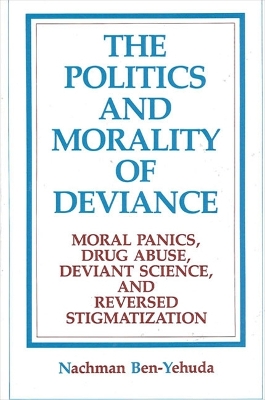SUNY series in Deviance and Social Control
3 total works
The Politics and Morality of Deviance develops a theoretical framework and then applies it to four different and specific case studies in an explicit attempt to put the sociology of deviance back into mainstream sociology. It argues that deviance should be analyzed as a relative phenomenon in different and changing cultures, vis-a-vis change and stability in the boundaries of different symbolic/moral universes. It also argues that the legitimization of power should be thought of in terms of a moral order that in turn defines the societal boundaries of different symbolic/moral universes.
Mills' concept of motivational accounting systems is utilized throughout the text in order to illustrate how the micro and macro levels of analysis can be integrated.
Mills' concept of motivational accounting systems is utilized throughout the text in order to illustrate how the micro and macro levels of analysis can be integrated.
Ben-Yehuda presents an in-depth inquiry into the nature and patterns of political assassinations and executions by Jews in Palestine and Israel. Extensive empirical evidence is used to analyze the social construction of violent and aggressive human behavior, using a sociology of deviance perspective. Political assassinations and executions are placed within their particular cultural matrix to describe how this specific form of killing has been conceptualized as part of an alternative system of justice.
"The taking of a human life is generally regarded as the ultimate evil. Given this fact, it is important to examine and understand how it is explained, justified, and cloaked in a 'vocabulary of motives.' Such acts are, in the author's words, 'socially constructed and interpreted,' dependent on the observer's location in a specific 'symbolic-moral universe.'Moreover, such acts (political assassination specifically) are manifestations of struggles that represent attempts to legitimate these world-views, rhetorical devices that serve to define 'boundary-markers' between such universes — moral crusades that attempt to validate one view vis-a-vis another.
This general approach to political assassinations is original. Its application to assassinations by Israelis is original. The fact that the book is empirical marks it off from many speculations on the subject. A number of the author's findings make a distinct contribution.
"The taking of a human life is generally regarded as the ultimate evil. Given this fact, it is important to examine and understand how it is explained, justified, and cloaked in a 'vocabulary of motives.' Such acts are, in the author's words, 'socially constructed and interpreted,' dependent on the observer's location in a specific 'symbolic-moral universe.'Moreover, such acts (political assassination specifically) are manifestations of struggles that represent attempts to legitimate these world-views, rhetorical devices that serve to define 'boundary-markers' between such universes — moral crusades that attempt to validate one view vis-a-vis another.
This general approach to political assassinations is original. Its application to assassinations by Israelis is original. The fact that the book is empirical marks it off from many speculations on the subject. A number of the author's findings make a distinct contribution.


